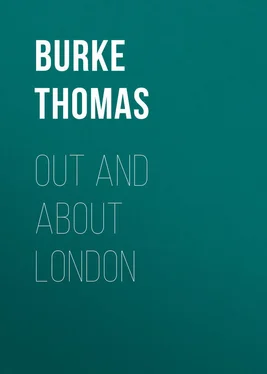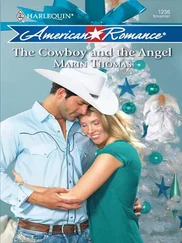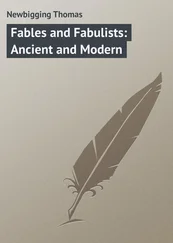Thomas Burke - Out and About London
Здесь есть возможность читать онлайн «Thomas Burke - Out and About London» — ознакомительный отрывок электронной книги совершенно бесплатно, а после прочтения отрывка купить полную версию. В некоторых случаях можно слушать аудио, скачать через торрент в формате fb2 и присутствует краткое содержание. Жанр: foreign_antique, foreign_prose, на английском языке. Описание произведения, (предисловие) а так же отзывы посетителей доступны на портале библиотеки ЛибКат.
- Название:Out and About London
- Автор:
- Жанр:
- Год:неизвестен
- ISBN:нет данных
- Рейтинг книги:5 / 5. Голосов: 1
-
Избранное:Добавить в избранное
- Отзывы:
-
Ваша оценка:
- 100
- 1
- 2
- 3
- 4
- 5
Out and About London: краткое содержание, описание и аннотация
Предлагаем к чтению аннотацию, описание, краткое содержание или предисловие (зависит от того, что написал сам автор книги «Out and About London»). Если вы не нашли необходимую информацию о книге — напишите в комментариях, мы постараемся отыскать её.
Out and About London — читать онлайн ознакомительный отрывок
Ниже представлен текст книги, разбитый по страницам. Система сохранения места последней прочитанной страницы, позволяет с удобством читать онлайн бесплатно книгу «Out and About London», без необходимости каждый раз заново искать на чём Вы остановились. Поставьте закладку, и сможете в любой момент перейти на страницу, на которой закончили чтение.
Интервал:
Закладка:
Under the meagre daylight and the opulent shadows of these docks you may drink beer and listen to casual chit-chat that carries you round the world and into magical hidden places, and brings you back with a jerk to the Isle of Dogs.
"Yerce. Two bob a pound the 'Ome an' Colonial was arstin' the missus for the stuff. I soon went round an' told 'em where they could put it. Well, 'sI was sayin', after we left Rangoon, we – "
The land in this district consists, for the most part, of oozing marsh, so that, when a gale sweeps from the mouth of the river, it reaches the island with unexpended force. Then the sky seems to scream in harmony with the rattling windows. Saloon signs swing grotesquely. The river assumes a steely hue, heaving and rushing, sucking against staples, wharves and barges, and rising in ineffectual splashes against the gates of the docks, until you seek the public bar of the "Dog and Thunderstorm" as a sanctuary. There, amid the babble of pewter and glass and the punctuation of the cash register, you forget any London gale in listening to stories of typhoons, cyclones, and other freaks of the elements common to the Pacific and the meeting of the waters round the Horn.
Many hours have I squandered on the ridiculous bridge of the Isle of Dogs, in sunlight or twilight, grey mist or velvet darkness, building my dreams about the boats as they dropped downstream to the oceans of the world and their ports with honey-syllabled names – Swatow, Rangoon, Manila, Mozambique, Amoy – returning in normal times, with fantastic cargoes of cornelian and jade, malachite and onyx, fine shapes of ivory and coral, sharp spices of betel-nut and bhang, and a secret tin or two of li-un – perhaps not returning at all. There I would stand, giving to each ship some name and destination born of my own fancy, and endowing it with a marvellous meed of adventure.
It is an exciting experience for the landsman Cockney, strolling the streets about the docks, to rub shoulders with other little Cockneys, in blue serge and cotton scarves, who have accepted the non-committal invitation offered by the funnel and the rigging over the walls of Limehouse Basin. One remembers the story of the pale curate at the church concert, at which one of the entertainers had sung a setting of Kipling's "Rolling Down to Rio." "Ah, God!" he said, wringing his thin hands, "that's what I often feel like… Rolling down to Rio." And in these streets one meets insignificant little men who have done it; who have rolled down to Rio and gone back to Mandalay, and seen the dawn come up like thunder outer China 'crost the Bay.
And I am proud to have nodding acquaintance with them. I am glad they have drunk beer with me. I am glad I have clicked the chopsticks in Limehouse Causeway with the yellow boys who can talk of Canton and Siam and North Borneo and San Francisco. I am glad I have salaamed noble men of India at the Asiatics' Home, and heard their stories of odourous villages in the hills and of the seas about India, and of strange islands which mere Cockneys pick out on the map with an uncertain forefinger – Andamans, Nicobars, Solomons, and so forth. I am glad from having met men who know Java as I know London; who know the best places in Tokio for tea and the most picturesque spots in Formosa; who can direct me to a good hotel in Singapore, should I ever go there, and who know where Irish whisky can be bought in Sarawak. Why study guidebooks, or consult with the omniscient Mr. Cook, when you may find about the great ornamental gates of the docks of London natives of all corners of the world who can provide you with a hundred exclusive tips which will make smooth the traveller's way over every obstacle or untoward incident? Indeed, why travel at all, when you may travel by proxy; when, by hanging round the docks of London, you may travel, on the lips of these men, through jungle, ocean, white town, palm grove, desert island, and suffer all the sharp sensations of standing silent upon a peak in Darien, the while you are taking heartening draughts of mild and bitter in the saloon bar of the "Star of the East"?
CHINATOWN REVISITED
"Chinatown, my Chinatown, where the lights are low" – a fragment of a music-hall song in praise of Chinatown which sticks ironically in my memory. The fact that the lights are low applies at the time of writing to the whole of London; and as for the word "Chinatown," which once carried a perfume of delight, it is now empty of meaning save as indicating a district of London where Chinamen live. To-day Limehouse is without salt or savour; flat and unprofitable; and of all that it once held of colour and mystery and the macabre, one must write in the past tense. The missionaries and the Defence of the Realm Act have together stripped it of all that furtive adventure that formerly held such lure for the Westerner.
It was in 1917 that I returned to it, after an absence of some years. In that year I received an invitation that is rightly accepted as a compliment: I was asked by Alvin Langdon Coburn to meet him at his studio, and let him make from my face one of those ecstatic muddles of grey and brown that have won for him the world's acknowledgment as the first artist of the camera. Our meeting discovered a mutual enthusiasm for Limehouse, and we arranged an excursion. There, we said to ourselves, we shall find yet a taste of the pleasant things that the world has forgotten: soft movement, solitude, little courtesies, as well as wonderful things to buy. There we shall find sharp-flavoured things to eat and drink, and josses and chaste carvings, and sharp knives. Oh, and the tea, too – the little two-ounce packets of suey-sen at sevenpence, that clothe the hour of five o'clock with delicate scents and dreams.
But the suey-sen was gone, done to death by the tea-rationing order. Gone, too, was the bland iniquity of the place. Our saunter through Pennyfields and the Causeway was a succession of disillusions. The spirit of the commercial and controlled West breathed on us from every side. All the dusky delicacies were suppressed. Dora had stepped in and khyboshed the little haunts that once invited to curious amusement. Opium, li-un, and other essences of the white poppy, secretly hoarded, were fetching £30 per pound. The hop-hoads had got it in the neck, and the odour of gin-seng floated seldom upon the air. The old tong feuds had been suppressed by stern policing, and Thames Police Court had become almost as suave and seemly as Rumpelmayer's. Even that joyous festival, the Feast of the Lanterns, kept at the Chinese New Year, had fallen out of the calendar. The Asiatic seamen had been made good by an Order in Council. All for the best, no doubt; yet how one missed the bizarre flame and salt of the old Quarter.
We found Pennyfields and the Causeway uncomfortably crowded, for the outward mail sailings were reduced, and the men who landed in the early days had been unable to get away. So the streets and lodging-houses were thronged with Arabs, Malays, Hindoos, South Sea Islanders, and East Africans; and the Asiatics' Home for Destitute Orientals was having the time of its life. Every cubicle in the hotel was engaged, and many wanderers were sleeping where they could. Those with money paid for their accommodation; for the others, a small grant from the India Office secured them board and bed until such time as proper arrangements could be made. The kitchens were working overtime, for each race or creed has its own inexorable laws in the matter of food. Some eat this and some eat that, and others will eat anything – save pork – provided that prayers are spoken over it by an appointed priest.
At half-past nine an occasional tipsy Malay might be seen about the streets, but the old riots and mêlées were things of the past. In the little public-house at the corner of Pennyfields we found the usual crowd of Chinks and white girls, and the electric piano was gurgling its old sorry melodies, and beer and whisky were flowing; but the whole thing was very decorous and war-timish.
Читать дальшеИнтервал:
Закладка:
Похожие книги на «Out and About London»
Представляем Вашему вниманию похожие книги на «Out and About London» списком для выбора. Мы отобрали схожую по названию и смыслу литературу в надежде предоставить читателям больше вариантов отыскать новые, интересные, ещё непрочитанные произведения.
Обсуждение, отзывы о книге «Out and About London» и просто собственные мнения читателей. Оставьте ваши комментарии, напишите, что Вы думаете о произведении, его смысле или главных героях. Укажите что конкретно понравилось, а что нет, и почему Вы так считаете.












